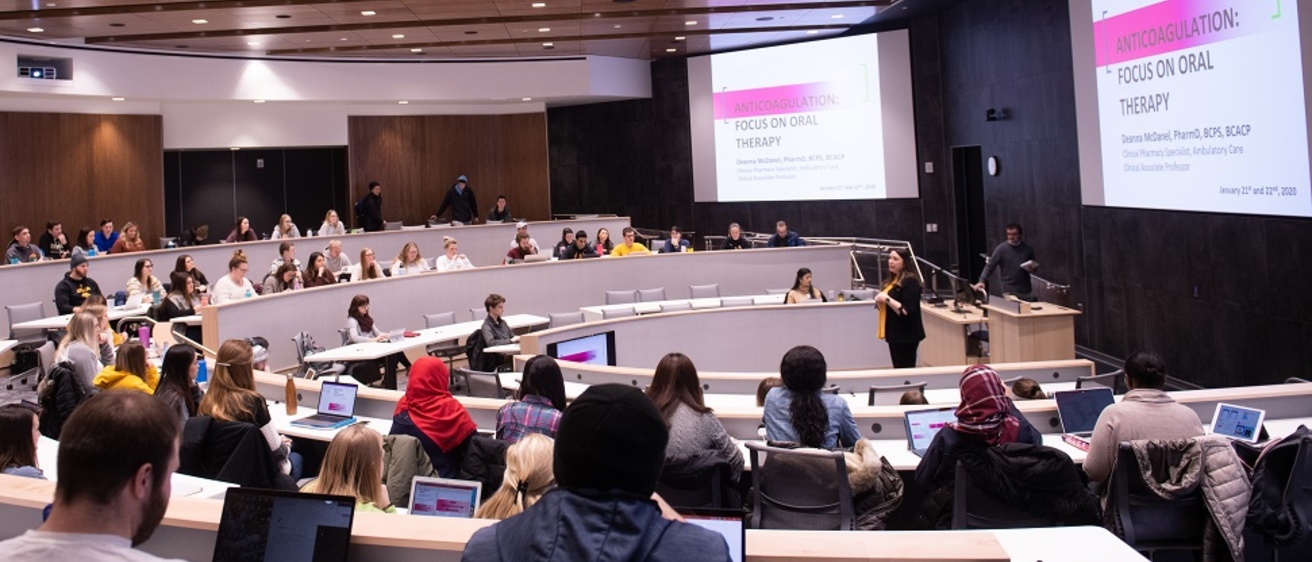Your Curriculum - Your Future
First Year
The first year as a pharmacy student is focused on creating a foundation of knowledge and skills to build on. Students have early exposure to a pharmacy career when they observe practicing pharmacists in a variety of settings.
White Coat Ceremony
Each year, the College of Pharmacy holds a special ceremony to welcome its newest Doctor of Pharmacy class into the college family. The White Coat Ceremony is a tradition that marks the beginning of a student's first semester and their formal entry into the pharmacy profession. During the ceremony, students receive their white coat, which symbolizes their commitment to the profession and their patients' health.
P1 year
P1 Fall Course List
| Course Number | Course | Description |
|---|---|---|
| PHAR:8130 | Foundations of Pharmacy Practice I | Introduction to contemporary pharmacy practice, small-group discussion, application of core concepts. (4 s.h.) |
| PHAR:8131 | Engagement: Professional Skills and Values | Develop as a professional prior to the beginning of classes, meet faculty, become acquainted with the college. (1 s.h.) |
| PHAR:8134 | Foundations of Health Services | Foundation issues for pharmacist practice related to social, economic, organizational design, etc. (3 s.h.) |
| PHAR:8135 | Health Information Retrieval and Informatics | Introduction and overview of health care information retrieval, organization, and dissemination. (3 s.h.) |
| PHAR:8136 | Foundations of Pharmaceutical Sciences | Introduction and overview of foundations of pharmaceutical sciences. (3 s.h.) |
| PHAR:8152 | Fundamentals of Compounding | Introduction to personalized drug delivery systems through the art of compounding. (1 s.h.) |
| PHAR:8132 | Continuing Professional Development1 | Engagement with the pharmacy profession and community through service and leadership activities and reflection. |
| PHAR:8133 | IPPE Career Exploration2 | On-site exposure to various pharmacist career opportunities in four different pharmacy practice patient care settings. (1 s.h.) |
Total Required Hours: 18-19
1 Continuing Professional Development is a longitudinal course that students engage in during the P1 through P3 years, with credit assigned in the P3 Spring. 2 50% of P1 students take IPPE Career Exploration in the Fall semester and 50% take it in the Spring semester.
P1 Spring Course List
| Course Number | Course | Description |
|---|---|---|
| PHAR:8151 | Clinical Investigation I | Research, Study Design, and Methods (3 s.h.) |
| PHAR:8140 | Foundations of Pharmacy Practice II | Introduction to contemporary pharmacy practice for first-year pharmacists. (4 s.h.) |
| PHAR:8148 | Pharmacokinetics and Dose Optimization | (2 s.h.) |
| PHAR:8149 | Foundations of Pharmacology and Toxicology | Principles of pharmacology and toxicology. (3 s.h.) |
| PHAR:8150 | Health, Wellness, and Disease | Overview of basic processes of good health and practices that promote wellness. (2 s.h.) |
| PHAR:8153 | Integrated Pharmacotherapy: Dermatology and Sensory | Key elements of science and practice of pharmacy presented in an integrated manner, focused on organ systems or disease states. (2 s.h.) |
| PHAR:8132 | Continuing Professional Development1 | Engagement with the pharmacy profession and community through service and leadership activities and reflection. |
| PHAR:8133 | IPPE Career Exploration2 | Hands-on exposure to various pharmacist career opportunities in four different pharmacy practice care settings. (1 s.h.) |
Total Required Hours: 16-17
1 Continuing Professional Development is a longitudinal course that students engage in during the P1 through P3 years, with credit assigned in the P3 Spring. 2 50% of P1 students take IPPE Career Exploration in the Fall semester and 50% take it in the Spring semester.
Second Year
Second year pharmacy students immerse themselves in Integrated Pharmacotherapy courses. These courses, organized by disease state or organ system are the bridge between the first year of foundational knowledge and the fourth year when students apply their knowledge.
Students participate in real-life pharmacy experiences in a community and hospital setting during their second year as well.
P2 Year
P2 Fall Course List
| Course Number | Course | Description |
|---|---|---|
| PHAR:8260 | Integrated Pharmacotherapy: Cardiovascular | Key elements of the science and practice of pharmacy presented in an integrated manner focused on cardiovascular diseases and conditions. (4 s.h.) |
| PHAR:8256 | Integrated Pharmacotherapy: Renal, Fluids, and Electrolytes | Key elements of the science and practice of pharmacy presented in an integrated manner focused on particular organ systems or disease states. (2 s.h.) |
| PHAR:8254 | Integrated Pharmacotherapy: Endocrine | Key elements of the science and practice of pharmacy presented in an integrated manner focused on endocrine diseases. (3 s.h.) |
| PHAR:8250 | Applications of Pharmacy Practice I | Expands on skills and concepts taught in the foundations of pharmacy practice course series and includes skills relevant to the disease states in the specific aligned component courses. (2 s.h.) |
| PHAR:8276 | Clinical Investigation II | Create and disseminate new knowledge related to pharmacy or health care with emphasis on design methods and data collection. (2 s.h.) |
| PHAR:8132 | Continuing Professional Development1 | Engagement with the pharmacy profession and community through service and leadership activities and reflection. |
| PHAR:8207 | IPPE Community2 | Exposure to the provision of care in a community pharmacy setting; activities focus on those experiences related to the community pharmacy environment, medication distribution, special products and populations, and related professional activities. (3 s.h.) |
| PHAR:8209 | Introductory Pharmacy Practice Experiences Hospital3 | Exposure to the provision of care in a hospital pharmacy setting; activities focus on those experiences related to the hospital pharmacy environment, medication distribution, special products and populations, and related professional activities. (3 s.h.) |
Total Required Hours: 13-19
1 Continuing Professional Development is a longitudinal course that students engage in during the P1 through P3 years, with credit assigned in the P3 Spring. 2 Students may take IPPE Community the summer preceding their P2 year, winter break of the P2 year, or the summer after their P2 year. 3 Students may take IPPE Hospital the summer preceding their P2 year, during the P2 year, or the summer after their P2 year.
P2 Spring Course List
| Course Number | Course | Description |
|---|---|---|
| PHAR:8261 | Integrated Pharmacotherapy: Neurology and Psychiatry | Key elements of the science and practice of pharmacy presented in an integrated manner focused on neurological and psychiatric diseases and conditions. (4 s.h.) |
| PHAR:8263 | Integrated Pharmacotherapy: Infectious Diseases | Key elements of the science and practice of pharmacy presented in an integrated manner focused on infectious diseases. (4 s.h.) |
| PHAR:8265 | Applications of Pharmacy Practice II | Expands on skills and concepts taught in the foundations of pharmacy practice course series and includes skills relevant to the disease states in the specific integrated pharmacotherapy courses. (2 s.h.) |
| PHAR:8275 | Advanced Health Services | Exploration of advanced topics in health service. (2 s.h.) |
| PHAR:8132 | Continuing Professional Development1 | Engagement with the pharmacy profession and community through service and leadership activities and reflection. |
| PHAR:8207 | Introductory Pharmacy Practice Experiences Community2 | Exposure to the provision of care in a community pharmacy setting; activities focus on those experiences related to the community pharmacy environment, medication distribution, special products and populations, and related professional activities. (3 s.h.) |
| PHAR:8209 | Introductory Pharmacy Practice Experiences Hospital3 | Exposure to the provision of care in a hospital pharmacy setting; activities focus on those experiences related to the hospital pharmacy environment, medication distribution, special products and populations, and related professional activities. (3 s.h.) *May be taken in a different session. |
Total Required Hours: 12-18
1 Continuing Professional Development is a longitudinal course that students engage in during the P1 through P3 years, with credit assigned in the P3 Spring. 2 Students may take IPPE Community the summer preceding their P2 year, winter break of the P2 year, or the summer after their P2 year. 3 Students may take IPPE Hospital the summer preceding their P2 year, during the P2 year, or the summer after their P2 year.
Third Year
During the third year, pharmacy students continue to immerse themselves in the Integrated Pharmacotherapy courses. The associated hands-on skills training activities create a bridge between knowledge and application. Third-year students spend some time with fourth year students on rotation and practice developing and presenting a patient case.
Early into the Spring semester, students have the opportunity to customize their education with professional electives, dual degree or certificate coursework, or early fourth-year practice experiences.
P3 Year
P3 Fall Course List
| Course Number | Course | Description |
|---|---|---|
| PHAR:8370 | Integrated Pharmacotherapy: Respiratory and Allergy | Key elements of the science and practice of pharmacy presented in an integrated manner focused on particular organ systems or disease states. (2 s.h.) |
| PHAR:8372 | Integrated Pharmacotherapy: Gastroenterology and Nutrition | Key elements of the science and practice of pharmacy presented in an integrated manner focused on particular organ systems or disease states. (3 s.h.) |
| PHAR:8352 | Integrated Pharmacotherapy: Musculoskeletal | Key elements of the science and practice of pharmacy presented in an integrated manner focused on musculoskeletal and musculoskeletal-related conditions. (4 s.h.) |
| PHAR:8374 | Applications of Pharmacy Practice III | Expands on skills and concepts taught in the foundations of pharmacy practice course series and includes skills relevant to the disease states in the specific aligned component courses. (2 s.h.) |
| PHAR:8132 | Continuing Professional Development1 | Engagement with the pharmacy profession and community through service and leadership activities and reflection. |
| PHAR:8301 | IPPE Clinical2 | This third IPPE is completed as an introduction to the Advanced Pharmacy Practice Experiences (APPE) to which student pharmacists are exposed during their P4 year; the IPPE clinical involves a P3 student observing and participating with a P4 student currently on an APPE rotation. (1 s.h.) |
Total Required Hours: 12
1 Continuing Professional Development is a longitudinal course that students engage in during the P1 through P3 years, with credit assigned in the P3 Spring. 2 Some students may complete IPPE Clinical the summer preceding their P3 year.
P3 Spring Course List
| Course Number | Course | Description |
|---|---|---|
| PHAR:8353 | Integrated Pharmacotherapy: Genitourinary and Reproductive | Key elements of the science and practice of pharmacy presented in an integrated manner focused on particular organ systems or disease states. (2 s.h.) |
| PHAR:8371 | Integrated Pharmacotherapy: Oncology and Hematology | Key elements of the science and practice of pharmacy presented in an integrated manner focused on particular organ systems or disease states. (2 s.h.) |
| PHAR:8378 | Pharmacy Law and Ethics | Topics include ethical behavior for pharmacists and student of pharmacy law. (2 s.h.) |
| PHAR:83XX | Applications of Pharmacy Practice IV | Expands on skills and concepts taught in the foundations of pharmacy practice course series and includes skills relevant to the disease states in the specific aligned component courses. (1 s.h.) |
| PHAR:8XXX | Professional Electives1 | (4 - 6 s.h.) |
| PHAR:8132 | Continuing Professional Development2 | Engagement with profession of pharmacy and community through service and leadership activities and reflection. (1 s.h.) |
Total Required Hours: 12 3
1 Students must complete 6 semester hours of professional electives to begin APPEs and 24 hours of general education electives to graduate.
2 Continuing Professional Development is a longitudinal course that students engage in during the P1 through P3 years, with credit assigned in the P3 Spring semester.
3 Students must take a minimum of 12 semester hours in the P3 Spring semester.
Fourth Year
Students in their fourth year put the previous three years into practice in real-life pharmacy experiences. Students are fully immersed in the life of a pharmacist as they complete rotations in a variety of settings. Students can customize their education with these rotations according to their interests or career goals.
P4 Year
P4 Summer
Advanced Pharmacy Practice Experiences. PHAR:94XX
Total semester hours: 12
P4 Fall
Advanced Pharmacy Practice Experiences. PHAR:94XX
Total semester hours: 18
P4 Spring
Advanced Pharmacy Practice Experiences. PHAR:94XX
Total semester hours: 18

Curriculum Overview
See a visual overview of the four-year curriculum.
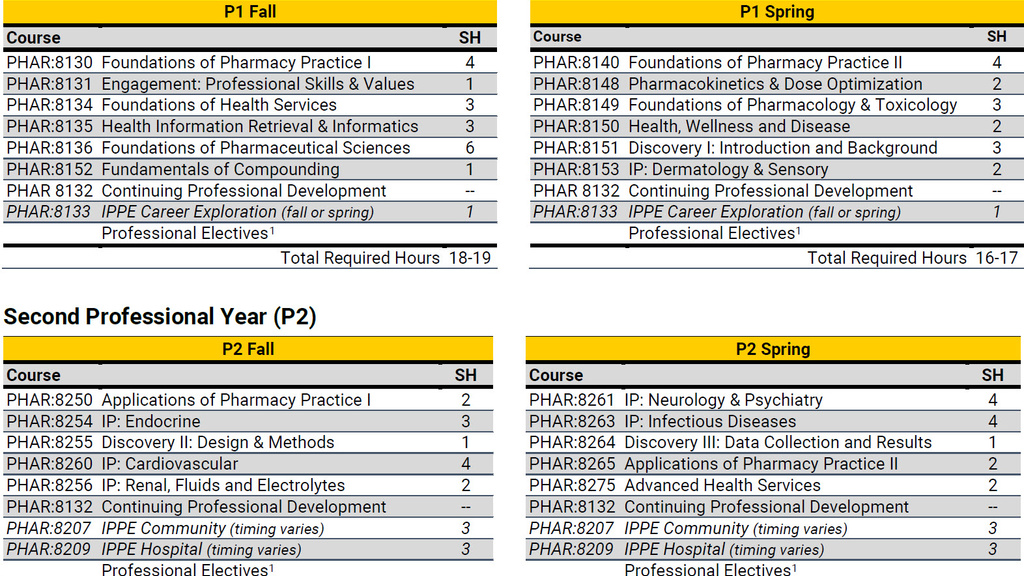
Curriculum Summary
See a summary of required courses by semester and year.
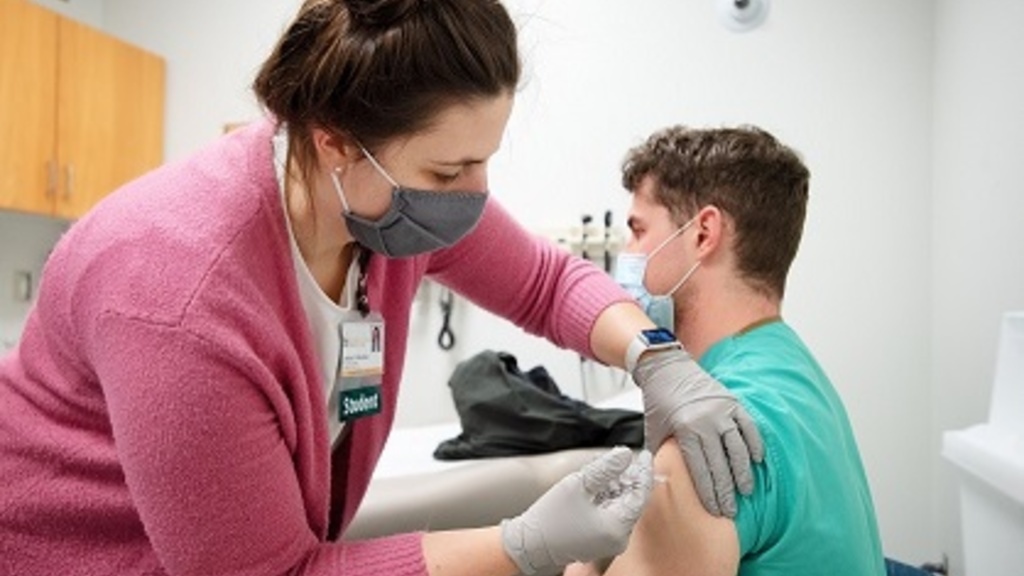
Personalize Your Education
Personalize your education through dual degrees, certificates, and elective courses.
PharmD Educational Outcomes
Students will become medication experts who pursue roles as practitioners, scientists, technologists, activists and entrepreneurs. They will have a broad perspective that includes knowledge of healthcare systems, policy, and practice in local, national, and international settings.
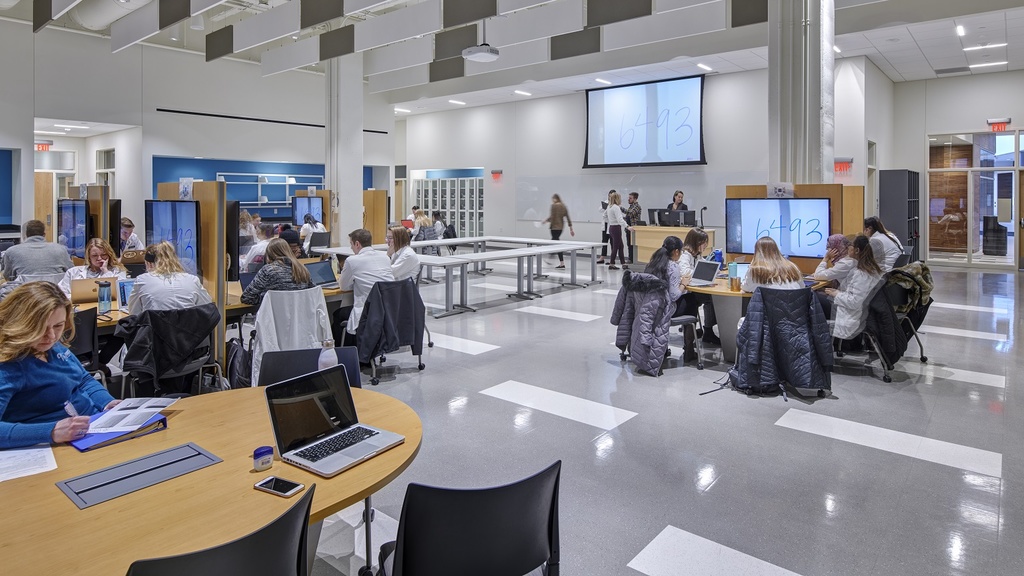
Hands-On Skills Training
Students develop and practice skills such as giving immunizations and counseling patients during a five-part course series: Foundations of Pharmacy Practice I & II and Applications of Pharmacy Practice I, II, & III.
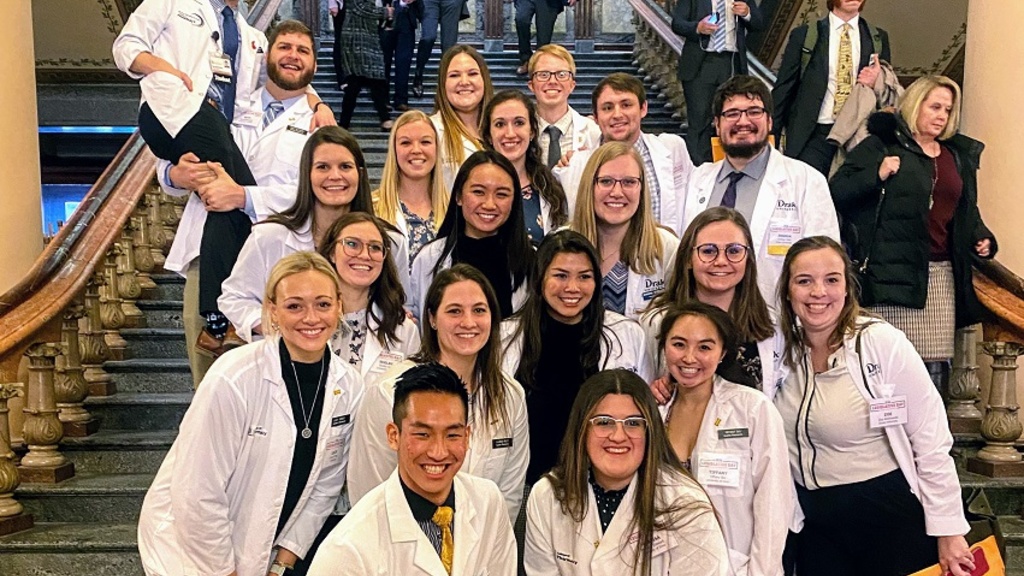
Service, Advocacy, and Development
There are many opportunities to expand your horizons and further develop as a professional.
Real-life Pharmacy Experiences
Pharmacy students get real-life pharmacy experience as they participate in Introductory Pharmacy Practice Experiences (IPPE) during the first three years and Advanced Pharmacy Practice Experiences (APPE) during their final year.

Global Opportunities
College of Pharmacy students may participate in one of five regularly occurring international advanced pharmacy practice experiences in Belize, Dominica, two locations in Japan, and Romania.
